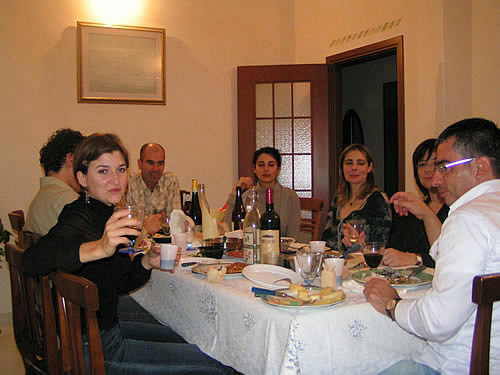How to Choose an Italian Language School in Italy
Top 10 Questions to Ask
By Emma Bird

|
|
The author is enjoying food, wine, and conversation in Italy.
|
"I've made you something really special for lunch," Mario's mum said, kissing me on the cheek. "I hope you like horse."
Being a strict vegetarian, I was less than thrilled that the family served a horse steak in my honor, but I also knew that if I refused, she would have caused a "brutta figura."
I looked for my boyfriend to get me out of this situation, but he had already gone, lugging our cases from his polished-to-perfection Alfa Romeo. As lunchtime approached, I was getting less and less hungry.
Of course, had my Italian been better, I would have known that a horse would never be on the menu. I had mistaken cavolo (cauliflower) for cavallo (horse).
Yet, this is a minor example of a problem that can occur when you try to immerse yourself in a new culture but don’t speak the language.
Admittedly, Italy is stunning. From the brick-red rooftops of Tuscany to the dazzlingly white villas of Sardinia, you could spend several months simply immersing yourself in your glorious Technicolor surroundings.
If you don’t speak the language you are missing out on the real experience — the people. It is like watching a film but with the sound turned down.
Even if you speak some Italian before you visit Italy, enrolling in a language school is the best way to become accustomed to the sing-song sounds of the language.

|

|
|
You can take Italian classes in the country to enjoy the varied pastoral beauties or in Italy's many great towns and cities to enjoy the cultural centers.
|
Choosing from Hundreds of Language School Options
Type "learning + Italian + Italy" into a search engine, and many pages will come back, listing hundreds of options, or you can navigate a listing site. So just how do you go about choosing the school that is most suitable for you?
You can search for a language school once you have decided upon your objectives. The first thing to do is consider your preferred location. The tourist haunts of Rome and Florence have far more language schools than small towns buried in the Ligurian hillsides. While this means that you will have more choice about the type of school you choose, you will also be mixing with far more English speakers. And it follows that the more Italian you speak, the more it will improve.
Once you have decided upon your objectives, you can start your search for a language school. The first thing to do is consider your preferred location. The tourist haunts of Rome and Florence have far more language schools than small towns buried in the Ligurian hillsides. While this means that you will have more choice about the type of school you choose, you will also be mixing with far more English speakers. And it follows that the more Italian you do speak, the more it will improve.
Apart from scrolling through the listings on a search engine, for a good starting point, try TransitionsAbroad.com's directory of language schools in Italy, from country to city schools around the country, with many cultural activities.
Get the Language School for Course Details
Before choosing a course, however, prospective students might wish to speak to a school director, check out their Facebook and other social media pages, and look at reviews (as many as possible, and through with a cautious eye, as reviews can be varied and biased).
Try to take into account the following general considerations:
-
Facilities Available: A good school will have many facilities: Italian-language books, WiFi, access to a computer lab, and perhaps a list of links to helpful text and video resources and online websites to improve your language skills. But don’t forget to check other things too: where is the school located and is it easily accessible on foot and by public transport? Is a bar or "mensa" (canteen) available at the school where you can eat lunch? (Probably not if it is a small school.) If not, find out if there are choices of bars and restaurants nearby where you can eat well on a budget?
-
Lesson Length: Another point often overlooked is the teaching time. In some schools, an hour is exactly 60 minutes. But in others, the lesson hour may only be 40-45 minutes long. Even if the schools insist on providing you with a complete package, ask for the hourly rate so that you can compare. Classes over an hour generally result in losing your attention unless combined with some other cultural activity.
-
Where to stay: Do you want to live in an apartment with other international students, in a homestay with a family, or bed & breakfast? A good school should be able to provide you with lots of different options. Remember, you will be forced to speak Italian if you are in a family. While this can be a scary option for some, it also means that you will continuously practice authentic Italian, meaning you will get a better return on your money.
-
Cultural Activities: Ask about the cultural program and whether it is an optional extra or integrated into the course. You need to know if you will be paying for a service you do not want. If this is your main priority, find out if the cooking or sailing lessons or pottery classes are in Italian or English, as this will make a difference to your language progression. Immersion programs have proven to be an excellent way of learning more about the culture while improving your language skills simultaneously.
-
The School’s Reputation: I started learning Italian nine years ago in a highly academic setting that wasn’t conducive to my learning needs. My progress was slow because I mistakenly thought that a university would offer a higher standard of education. Only when I sought out a friendly but professional teacher who insisted on teaching me over aperitifs at the beach did my Italian improve.
I started learning Italian nine years ago in a highly academic setting that wasn’t conducive to my learning needs. My progress was slow because I mistakenly thought that a university would offer a higher standard of education. It was only when I sought out a friendly but professional teacher who insisted on teaching me over aperitifs at the beach that my Italian began to improve.
There are no hard and fast rules for learning Italian, but you need a school and teachers that suit you and your personality.
If you do that, you are likely to choose the school that is right for you.
Top Ten Questions to Ask:
-
How big is the class and the school?
-
Can I get extra help if I need it?
-
How much experience do teachers have, and do they speak languages?
-
Will I be in a group according to my ability?
-
Will there be lots of other English speakers there?
-
What is the attitude of the locals towards international students?
-
Does the school offer the facilities I want?
-
Will I be treated as an individual or just a number?
-
Is there a good social/cultural program?
-
Is my gut instinct positive?
Emma Bird is a freelance writer in Sardinia, Italy.
|
